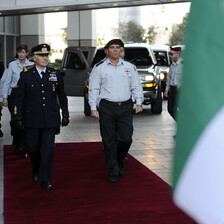The Electronic Intifada Rome 19 November 2013

Prime Minister of Italy Enrico Letta embraces Benjamin Netanyahu. (Palazzo Chigi/Flickr)
When political leaders from Italy and Israel gather for a summit in Turin next month, they will celebrate a flourishing friendship — one in which Italy helps Israel obscure its bloodstained reality.
The official talk ahead of the 2 December meeting is of political, economic and cultural agreements. Passing under the radar, however, is the intense military cooperation between the two countries.
One testament to the strength of this cooperation was a recent visit to Israel by Lieutenant General Pasquale Preziosa, chief of staff of the Italian air force. He was there as the personal guest of General Amir Eshel, commander of the Israeli Air Force (“Chief of staff of Italian air force visits Israel,” Palestinian Centre For Human Rights, 30 October).
Preziosa arrived ahead of the upcoming “Blue Flag” air drill, the largest multinational aerial exercises in Israeli history, which will see the participation of Italy and Greece, two European countries in dire economic straits, as well as Israel’s staunch ally, the US (“US to join largest aerial drill in Israel’s history, along with Italy, Greece,” Haaretz, 6 November).
During the training exercises, more than 100 combat aircraft and some 1,000 military personnel will take part in air-to-air and air-to-ground missions planned by Israel at the Ovda air base in the Naqab (Negev) desert.
Lethal
Preziosa’s visit in late October coincided with details of a lethal new program being made public by the Israeli Air Force (IAF).
Known as Expanding Attack Capacity (EAC), the new program is designed to increase the number of targets that Israel can detect and destroy by a factor of ten.
Brigadier General Amikam Norkin, the IAF’s chief of air operations, summarized how EAC will work in an interview with Defense News (“Israeli Air Force plan shoots for 10-fold boost in bombs on target,” 27 October).
Under EAC, a “massive, persistent and punishing” use of so-called precision air power would reduce the duration of future wars and the demand for ground forces, according to Norkin. He indicated that Israel wishes to be able to hit many more targets than it did when it bombed Gaza in November 2012.
During that eight-day attack, Israel killed more than 170 Palestinians, destroyed 450 homes and damaged another 8,000.
At €473 million ($634 million) Israel was the Italian weapons industry’s top customer for 2012, according to the Rome government’s annual report for arms exports. This is largely due to the purchase of thirty M-346 combat trainer jets from Alenia Aermacchi, part of the Italian weapons-maker Finmeccanica, as part of a lopsided reciprocal procurement package in which Italy acquired approximately $1 billion in Israeli military and surveillance equipment (“Finmeccanica wins $1 bn Israeli deal,” The Financial Times, 19 July 2012).
Courting Israel
The Turin summit will be the fourth such high-level meeting between Italy and Israel.
Relations between the two sides have become so close over the past few years that Benjamin Netanyahu, the Israeli prime minister, said in 2010 that he didn’t believe that Israel had a “better friend” than his then Italian counterpart Silvio Berlusconi (“Netanyahu to Berlusconi: Israel lucky to have you as a friend,” Ynet, 1 February 2010).
Since then there have been two changes of government in Rome. Yet Enrico Letta, head of a broad coalition government, appears just as anxious to intensify already strong relations with Israel as the two previous prime ministers, Mario Monti and Silvio Berlusconi.
Just two months after taking office earlier this year, in his first trip out of Europe, Letta, met Netanyahu in Jerusalem, stating relations couldn’t be better and Italy had much to learn from Israel. In October, during a press conference with Netanyahu, who was in Rome for meetings with the US Secretary of State John Kerry, Letta predicted that the Turin summit would bolster Italy’s political, economic and cultural relations with Israel.
Letta, as it happens, has a history of courting Israel. As an industry minister in 2000, he signed an agreement for scientific, technological and industrial research cooperation between Israel and Italy.
Lucrative
Thirteen years later, a note from the Tel Aviv office of Italy’s National Institute of Foreign Trade indicates that cooperation between Israel and Italy has proven particularly lucrative in the aerospace and cyber-security industries. The latter sector, though referred to more precisely as cyber-warfare, was also on the agenda of the 5 November visit to Italy by Benny Gantz, chief of staff in the Israeli military, as well as during a series of annual conferences organized by the Israeli company Maglan at Rome’s La Sapienza University.
Student groups, who saw through the security veil and recognized this as the next frontier in technological warfare, protested this year’s event.
During his “mission for growth” seeking to establish closer relations between Israel and the European Union in October, Antonio Tajani, the European commissioner for industry and enterprise, brought along ten Italian companies. Two of these, Selex and Global Services, are part of Finmeccanica Group, a partially state-owned conglomerate and one of the world’s top ten weapons manufacturers.
Tajani, nominated to the European Commission by Berlusconi, has long been an apologist for Israel.
Italy’s shameful support for Israeli apartheid is not going unchallenged. Plans are underway for three days of protests in Turin, with a national demonstration on 30 November, calling for the suspension of all agreements between Italy and Israel.
Although Netanyahu might think he has no better friend than Italy, these protests will emphasize that his allies represent an elite, not the general population.
Stephanie Westbrook is a US citizen based in Rome, Italy. Her articles have been published on Common Dreams, Counterpunch, The Electronic Intifada, In These Times and Z Magazine. Follow her on Twitter @stephinrome.






Comments
competition
Permalink Eric replied on
Stephen Harper will contest the designation.
So will the Jewish National Fund: http://toronto.jnf.ca/negev2013/
Re Harper's aid to the attack on Syria, see
www.globalresearch.ca/canadas-...